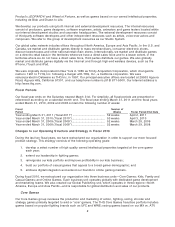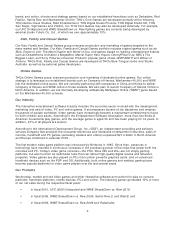THQ 2010 Annual Report Download - page 20
Download and view the complete annual report
Please find page 20 of the 2010 THQ annual report below. You can navigate through the pages in the report by either clicking on the pages listed below, or by using the keyword search tool below to find specific information within the annual report.12
We believe that quarter-to-quarter comparisons of our operating results are not a good indication of our
future performance. We may not be able to maintain consistent profitability on a quarterly or annual basis. It
is likely that in some future quarter, our operating results may be below the expectations of public market
analysts and investors as a result of the factors described above and others described throughout this “Risk
Factors” section, which may in turn cause the price of our common stock to fall or significantly fluctuate.
Our sto ck price has been volatile and may cont inue to fluctuate significantly.
The market price of our common stock historically has been, and we expect will continue to be, subject to
significant fluctuations. These fluctuations may be due to factors specific to us (including those discussed in
this “Risk Factors” section, as well as others not currently known to us or that we currently do not believe are
material), to changes in securities analysts’ earnings estimates or ratings, to our results or future financial
guidance falling below our expectations and analysts’ and investors’ expectations, to factors impacting the
entertainment, computer, software, Internet, media or electronics industries, to our ability to successfully
integrate any acquisitions we may make, or to national or international economic conditions. In particular,
economic downturns may contribute to the public stock markets’ experiencing extreme price and trading
volume volatility. These broad market fluctuations have and could continue to adversely impact the market
price of our common stock.
Video game produc t development schedules are diffi cult to predict and can be subject to delays.
Postponements in shipments can substantially i mpac t our sales and profitability in any given
quarter.
Our ability to meet product development schedules is impacted by a number of factors, including the creative
processes involved, the coordination of large and sometimes geographically-dispersed development teams
required by the complexity of our products, the need to localize certain products for distribution outside of the
U.S., the need to refine our products prior to their release, and the time required to manufacture a game
once it is submitted to the platform manufacturer. In the past, we have experienced development and
manufacturing delays for several of our products. Failure to meet anticipated production schedules may
cause a shortfall in our expected sales and profitability and cause our operating results in any given quarter
to be materially different from expectations. Delays that prevent release of our products during peak selling
seasons or in conjunction with specific events, such as the release of a related movie, could significantly
impact the sales of such products and thus our profitability.
Our business i s dependent upon the suc cess and availability of the video game plat forms on
which consumers play our games .
We derive most of our net sales from the sale of products for play on video game platforms manufactured by
third parties, such as PS3 and PSP, Xbox 360, and the Wii and DS. The following factors related to such
platforms can adversely impact sales of our video games and our profitability:
Popularity of platforms.
In the previous console platform cycle, the PS2 was the best-selling platform
and games for that platform dominated software sales. In the current platform cycle, the Wii is the best-selling
console platform to date, and in calendar 2009, the Wii surpassed the Xbox 360 as the most popular
console in terms of software game sales, according to IDG. However, recent trends indicate that the PS3 and
Xbox 360 may be gaining popularity over the twelve months ended March 31, 2011. Since the typical
development cycle for a console, handheld, or PC game is from 9 to 36 months, we must make decisions
about which games to develop on which platforms based on current expectations of what the consumer
preference for the platforms will be when the game is finished. Launching a game on a platform that has
declined in popularity, or failure to launch a game on a platform that has grown in popularity, could negatively
impact our net sales and profitability.
Platform pricing.
Prices for the current generation of console platforms are higher than for their
respective predecessor platforms. The Xbox 360 can cost as much as $299.99, the Wii is priced at $199.99
and the PS3 costs $299.99. The cost of the hardware could adversely impact the sales of these platforms,
which could in turn negatively impact sales of our products for these platforms since consumers need a
platform in order to play our games.
Platform shortages.
In the past few years, many of the platforms on which our games are played
have experienced shortages. Platform shortages generally negatively impact the sales of video games since
consumers do not have consoles on which to play the games.
























